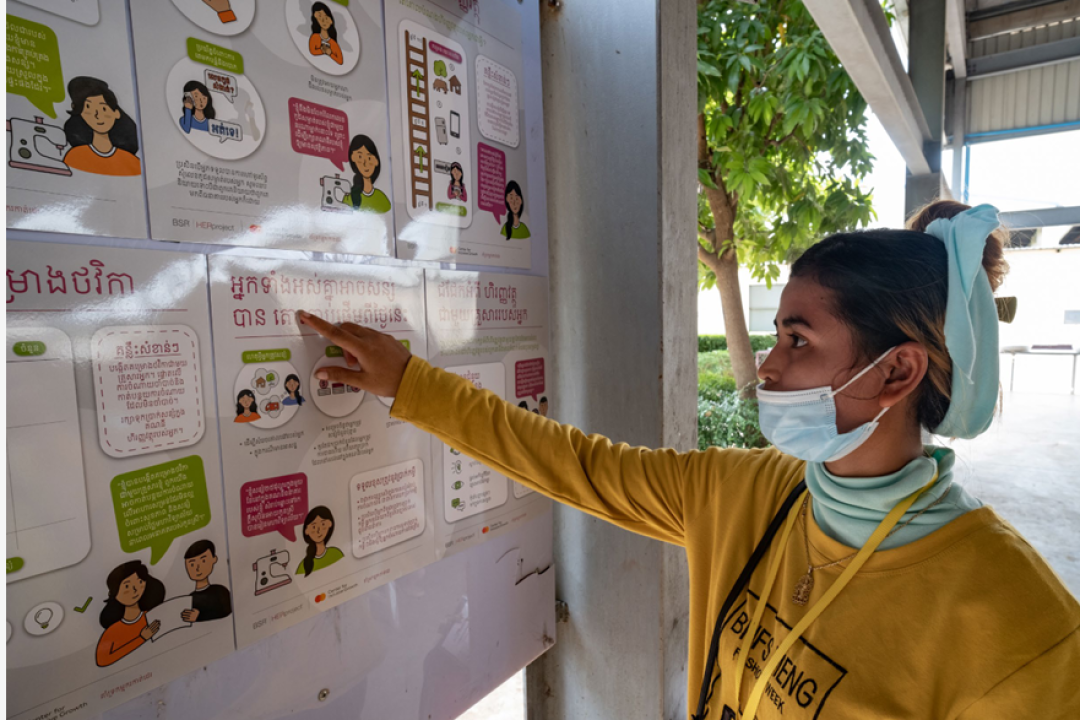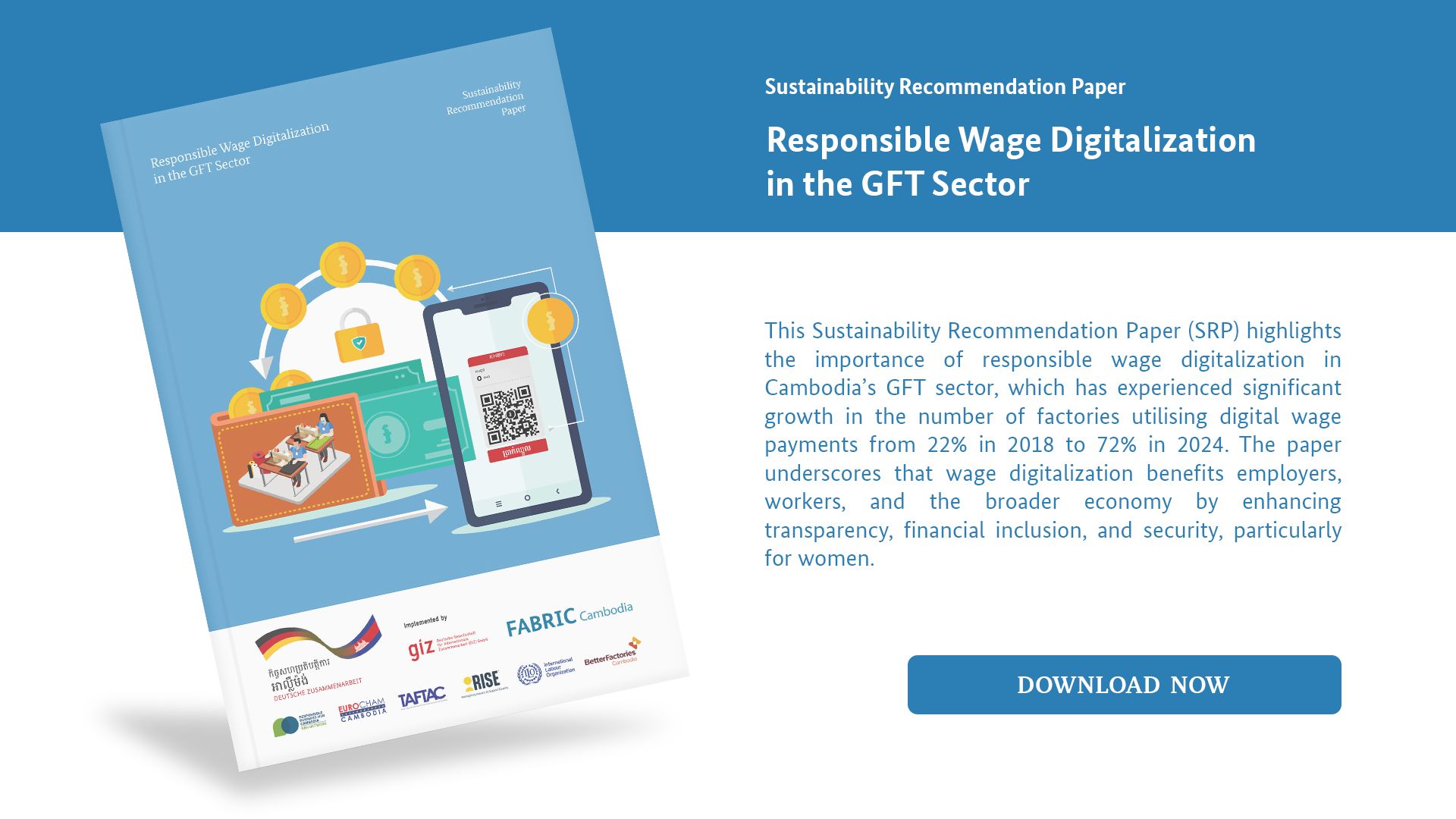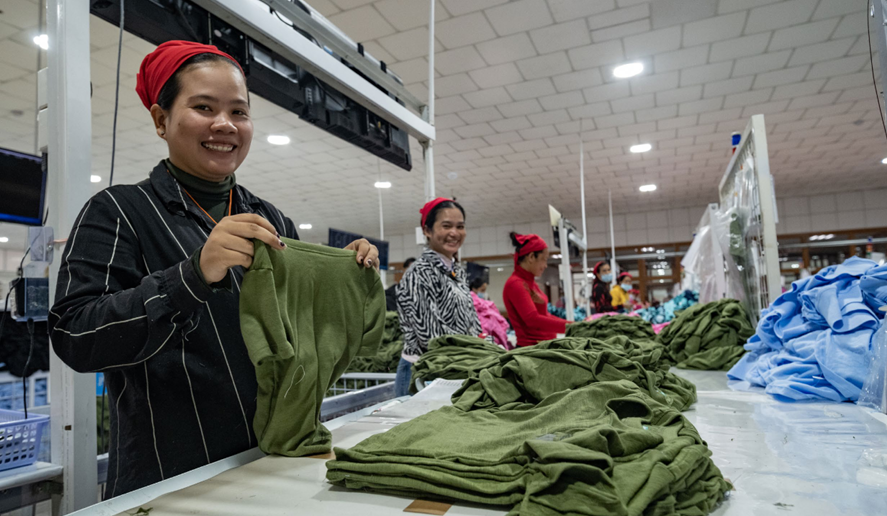Study Calls For Improvements In Wage Digitalisation In Cambodia's Garment, Footwear, And Travel Goods Sector

EuroCham Cambodia’s Responsible Business Hub (RBH), with the support of GIZ FABRIC Cambodia; the Textile, Apparel, Footwear & Travel Goods Association in Cambodia (TAFTAC); the International Labour Organisation (ILO); Better Factories Cambodia (BFC); and RISE, launched a Sustainability Recommendation Paper on October 11, 2024.
The paper looks at wage digitalisation in Cambodia and provides recommendations on how it can be improved.
Wage digitalisation in Cambodia's Garment, Footwear, and Textile (GFT) sector has seen rapid growth – just 22 per cent of export-facing factories paid digital wages in 2018, a figure which has shot up to 72 per cent of BFC member factories as of 2024, covering 84 per cent of the workforce.

The paper attributes this progress to several initiatives promoting responsible digital wage payments by industry stakeholders, including TAFTAC, as well as to digital and financial reforms implemented by the National Bank of Cambodia (NBC).
The study emphasises that wage digitalisation in the GFT sector benefits employers, workers, and the broader economy by enhancing transparency, financial inclusion, security, as well as private sector competitiveness, which is crucial for a sector that directly employs at least 925,000 workers, nearly 75 per cent of whom are women.
The paper proposes that wage digitalisation can lead to cost savings for factory owners, increased adoption of digital payroll solutions, and improved access to financial services, however, limited infrastructure in Cambodia’s rural areas, along with low financial literacy among workers, indicate that further efforts are needed to make the switch to digital smoother.
Benefits Of Wage Digitalisation In Cambodia
According to the study, digitalising wage payments aligns with Cambodia’s Pentagonal Strategy regarding private sector employment development, and advances strategic objectives for building a digital economy and society, including:
- Goal 5 of the Pentagonal Strategy, which focuses on developing the digital economy and society.
- The National Financial Inclusion Strategy (NFIS) 2019-2025, which emphasises financial inclusion and digital transformation.
Digitalising wage payments in the GFT sector also helps to improve transparency and efficiency, demonstrates modernity, and increases financial inclusion and security for workers, especially women. The latter is particularly effective when accompanied by financial capability training tailored to the needs of women.
The report states:
With the right support, wage digitalisation enables workers to access a range of financial products and services, including digital payments, remittances, and savings accounts, leading to greater financial security and women’s economic empowerment.
Other key findings the study highlights on the benefits and ways in which wage digitalisation can be smoothly implemented are:
- Cost Savings: Transitioning from cash to digital wage payments can significantly reduce expenses for factory owners.
- Adoption of Digital Solutions: With appropriate digital wage solutions and support, both male and female workers are likely to accept and use payroll accounts, enabling them to access a variety of financial products and services.
- Supportive Ecosystem: Cambodia's existing infrastructure is conducive to wage digitalisation, featuring accessible smartphones, affordable internet, advanced digital payment systems (e.g., ABA, Bakong, Wing Bank, ACLEDA), and a growing number of merchants in urban garment areas accepting digital payments.
Integrating responsible wage digitalisation more deeply into these initiatives can expand financial inclusion and foster a formal, active market for financial service providers (FSPs). Moreover, it supports businesses in transitioning from informal to formal operations, enhancing transparency and financial security for workers.
Challenges Of Implementing Wage Digitalisation In Cambodia
The study identified several challenges for wage digitalisation in Cambodia, including gaps in regulatory frameworks, limited digital and financial infrastructure in rural areas, and insufficient capacities of factories that hinder progress.
Additionally, the lack of digital and financial literacy, inadequate financial services, and problematic banking practices mean that workers, particularly the most vulnerable individuals and women, are unable to fully benefit from wage digitalisation. Lessons from countries such as Bangladesh reveal that ongoing assistance is essential to facilitate wage digitalisation, particularly for non-export-facing factories that have been slower to adopt these changes.
The study summarised the main challenges as such:
- Limited Experience: Many managers lack experience with digital payroll and prefer familiar cash-based systems.
- Inadequate Support for Workers: Workers, especially first-time account users, require education and support to confidently use financial products.
- Lack of Access to Cash-Out Options: Limited access to automated teller machines (ATMs) in rural areas makes workers hesitant to embrace digital wages fully.
- Financial Ecosystem: A cash-centric ecosystem is still prevalent, with insufficient acceptance of digital payments outside urban areas.
- Gender-Specific Challenges: Women face unique barriers, including societal norms that may limit their control over finances, necessitating targeted support.
- Non-Export Facing Factories: These factories are slower to adopt digital payments, leaving their workers particularly vulnerable and unaware of their rights.
- Banking Practices: While digital wages can facilitate access to formal financial services, aggressive lending practices could lead to over-indebtedness. Financial products should focus on promoting savings rather than loans.
According to the 2021 World Bank Global Findex, only 31 per cent of women and 34 per cent of men in Cambodia have accounts with financial institutions, while a mere 5 per cent of women and 6 per cent of men hold mobile money accounts. This limited access significantly hampers the adoption of digital payments.
The report highlights a concerning level of financial literacy, noting that only 40 per cent of women workers have completed primary education. Furthermore, the World Bank indicates that 55 per cent of Cambodians over the age of fifteen have borrowed money, with 31 per cent borrowing from formal institutions. In contrast, only 32 per cent of individuals report saving, and a scant 7 per cent save through financial institutions.
Additionally, many garment workers express concerns about the security and safety of receiving digital wages and managing financial accounts.
The report noted:
They may lack the skills, knowledge, or confidence to use their accounts safely, particularly women. In 2021, it was estimated that 40 per cent of Cambodian garment workers withdrew their entire salaries on the same day they were paid. Those who lack confidence in using ATMs may even hand over their account details to someone else to cash out for them, exposing them to the risk of fraud.
Furthermore, 51 per cent of women reported relying on a family member, friend, or agent, or not knowing how to conduct financial transactions. It is crucial that employers and workers are provided with information, guidance, and advice throughout the wage digitalisation process.
For women, adopting and benefiting from wage digitalisation can represent a significant step. Activities that promote wage digitalisation and enhance financial literacy must explicitly consider gender differences and address the specific needs of women workers.
Study Recommendations
During a Consultation Workshop on the Sustainability Recommendation Papers (SRP) held in February 2024, it was suggested that all key actors must collaborate to create an enabling environment for responsible wage digitalisation in Cambodia's GFT sector.

To achieve this, the government, along with all industry stakeholders – including the private sector (buyers, suppliers, vendors, and industry associations), FSPs, civil society organisations (CSOs), and development partners – should adopt an integrated approach to creating an enabling environment for digital wage payments.
- The government (NBC and Ministry of Labour and Vocational Training) can support this by implementing appropriate legal instruments and incentives, and by ensuring financial education and uninterrupted internet access for all.
- FSPs can enhance their ATM networks, design appropriate apps, and develop savings products and services tailored to the specific needs of women and people with disabilities.
- Private sector stakeholders should support the transition from cash to digital wage payments by providing management advisory services and worker training on the benefits of digital wages and the use of relevant financial services.